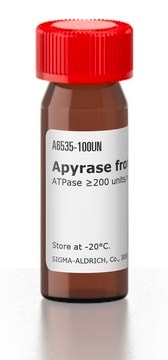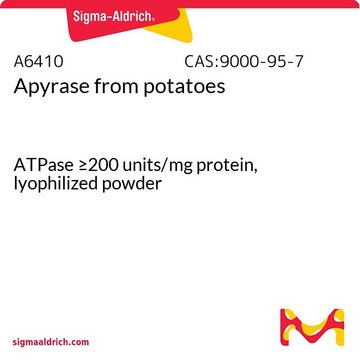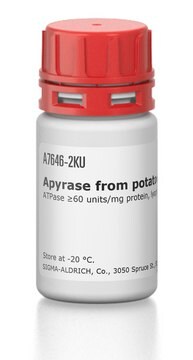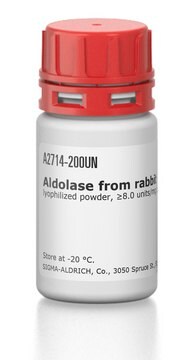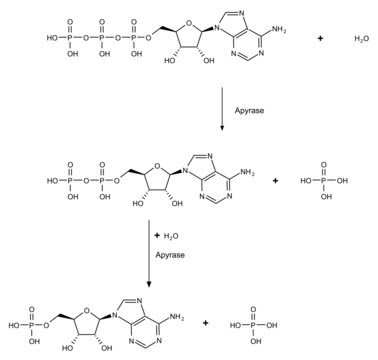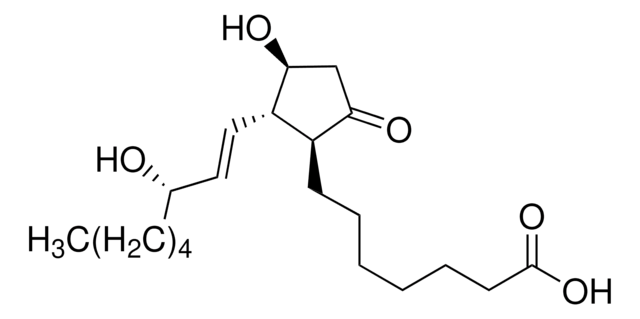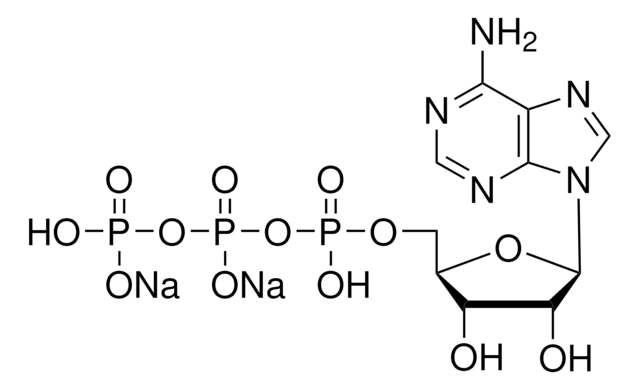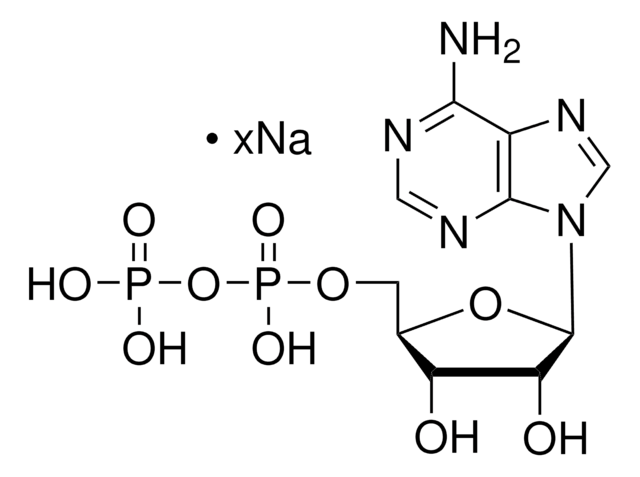A6132
Apyrase from potatoes
ATPase ≥3.0 units/mg protein, lyophilized powder
Synonym(s):
Adenosine 5′-diphosphatase, Adenosine 5′-triphosphatase
Sign Into View Organizational & Contract Pricing
All Photos(4)
About This Item
Recommended Products
biological source
potato
Quality Level
type
Grade I
form
lyophilized powder
ATPase activity
≥3.0 units/mg protein
composition
Protein, 30-60%
storage temp.
−20°C
Looking for similar products? Visit Product Comparison Guide
Application
Apyrase is used to hydrolyze nucleoside triphosphates and diphosphates. Apyrase, from Sigma, has been used in inhibition studies of platelet-aggregation .
At least two isoenzymes are found in different varieties of S. tuberosum: one with a high ATPase/ADPase ratio (∼10) and another with a low ratio (∼1).
Reaction: ATP → ADP+Pi → AMP+2Pi.
Reaction: ATP → ADP+Pi → AMP+2Pi.
Biochem/physiol Actions
Apyrase is found in all eukaryotes and some prokaryotes. Apyrase, from potato, has a crucial role in regulating growth and development. Apyrase is involved in the inactivation of synaptic ATP as a neurotransmitter following nerve stimulation and in the inhibition of ADP induced platelet aggregation to prevent thrombosis . Divalent metal ions are required for activity and best activity is observed with calcium ion at 5 mM.
Packaging
Sold on the basis of ATPase units.
Other Notes
Mixture of high and low ratio isoenzymes.
Unit Definition
One unit will liberate 1.0 micromole of inorganic phosphorus per minute at pH 6.5 at 30 °C
Physical form
Partially purified, lyophilized powder containing potassium succinate
Signal Word
Danger
Hazard Statements
Precautionary Statements
Hazard Classifications
Resp. Sens. 1
Storage Class Code
11 - Combustible Solids
WGK
WGK 1
Flash Point(F)
Not applicable
Flash Point(C)
Not applicable
Personal Protective Equipment
dust mask type N95 (US), Eyeshields, Gloves
Certificates of Analysis (COA)
Search for Certificates of Analysis (COA) by entering the products Lot/Batch Number. Lot and Batch Numbers can be found on a product’s label following the words ‘Lot’ or ‘Batch’.
Already Own This Product?
Find documentation for the products that you have recently purchased in the Document Library.
Customers Also Viewed
Avanish Rai et al.
Bio-protocol, 11(1), e3874-e3874 (2021-03-19)
Isoprenoids represent the largest class of metabolites with amazing diversities in structure and function. They are involved in protecting plants against pathogens or herbivores or involved in attracting pollinators. Isoprenoids are derived from geranyl diphosphate (GPP; C10), farnesyl diphosphate (FPP;
V T Nachmias et al.
FEBS letters, 378(3), 258-262 (1996-01-15)
Capping of the barbed-ends of actin filaments is an important mechanism for control of the cytoskeleton. In platelets, a valuable model system, it has been thought that gelsolin was the major capping protein. We now report that platelets contain approximately
Mathieu F Chevalier et al.
Blood, 121(1), 29-37 (2012-10-09)
Natural regulatory T cells (Tregs) participate in responses to various chronic infections including HIV. HIV infection is associated with a progressive CD4 lymphopenia and defective HIV-specific CD8 responses known to play a key role in the control of viral replication.
Nicholas J Roberts et al.
Plant physiology, 161(1), 556-567 (2012-11-09)
Nodulation in legumes requires the recognition of rhizobially made Nod factors. Genetic studies have revealed that the perception of Nod factors involves LysM domain receptor-like kinases, while biochemical approaches have identified LECTIN NUCLEOTIDE PHOSPHOHYDROLASE (LNP) as a Nod factor-binding protein.
Tsan-Yu Chiu et al.
Plant & cell physiology, 53(11), 1913-1925 (2012-10-05)
Nucleoside triphosphate diphosphohydrolases (NTPDases; apyrases) (EC 3.6.1.5) hydrolyze di- and triphosphate nucleotides, but not monophosphate nucleotides. They are categorized as E-type ATPases, have a broad divalent cation (Mg(2+), Ca(2+)) requirement for activation and are insensitive to inhibitors of F-type, P-type
Our team of scientists has experience in all areas of research including Life Science, Material Science, Chemical Synthesis, Chromatography, Analytical and many others.
Contact Technical Service